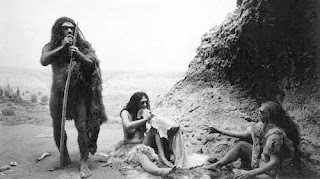Our world is made up of our past. Without our pasts there would be no futures in front of us. We would be forever snared in the present. Our pasts may be extraneous bits of information that most don't take the time to reflect upon; but without them we would be at an impasse.
 |
| Which Came First? |
Our pasts may be important, but are they vital? Or just insipid facts worth forgetting?
Forget.
I could see why people would think it best to castigate all of the remembrances of our pasts as a human race. Why remember generations that don't appear necessary for our lifetime? I mean, don't our history classes give us enough insipid data for us to drool-over?
We live in the world of the "tech-ies". My generation has evolved and adapted with all of the new technologies that surround us today. Our ancestors tell the stories of when they were younger, and they were lucky to have a radio. Books were their "get-aways". But in our futures--with our children--they will gape at us as we share the stories of when we had regular DVD players, or when the first iPods came out. I come to wonder: Is it us evolving? Or are we adapting to the evolving technologies'? And is this a good or bad thing? The new technologies are a beneficial part of our future; as long as we remember our pasts.
 Recently, a new iPhone (the iPhone 4S) came out. There were millions of people lined-up outside Apple stores on June 24th; eagerly awaiting for their new phones. Once they receive them, they are filled with copious amounts of happiness, and love their iPhone for days. But after the new iPhone 4S is slowly absorbed, its avarice is slowly emaciated. We begin to examine our phones and doubt our sudden purchase(s). In a raw report of the iPhone 4S, they state that the new iPhone isn't very different than Apple's previous product: the iPhone 4. "it's no radical rethinking of last year's iPhone 4".
Recently, a new iPhone (the iPhone 4S) came out. There were millions of people lined-up outside Apple stores on June 24th; eagerly awaiting for their new phones. Once they receive them, they are filled with copious amounts of happiness, and love their iPhone for days. But after the new iPhone 4S is slowly absorbed, its avarice is slowly emaciated. We begin to examine our phones and doubt our sudden purchase(s). In a raw report of the iPhone 4S, they state that the new iPhone isn't very different than Apple's previous product: the iPhone 4. "it's no radical rethinking of last year's iPhone 4".
What these reporters don't seem to manifest, is the evidence of how far we have come in life. They can't comprehend the fact that once in our lives, we had the first iPhone. It didn't have a number; or a successor. It was just one of Steve Jobs's experimental sales. Although, it almost immediately became a necessity to the public, and all other Internet-savvy phones were immediate forms of ignominy.
"We are made wise not by the recollection of our past, but by the responsibility of our future."
~Anonymous~
Remember.
 Look around the room you're currently in. You will find yourself oblivious to the motley pieces of technology that surround you. Now, expunge all of those lovely technologies out of the room. Think hard about the items you are about to jettison from your life...
Look around the room you're currently in. You will find yourself oblivious to the motley pieces of technology that surround you. Now, expunge all of those lovely technologies out of the room. Think hard about the items you are about to jettison from your life...
Many people may stop after they ostracize their computers and cell phones and assume they are done. But what they don't think about is that everything we have today has evolved at some point in time. That includes: any supplies, furniture, clothing, and even the very structure you find yourself in. In the end, you find yourself sitting bare upon a pile of rocks.
You--as well as every other human being--are oblivious of the circumstances you have been blessed with. You may also be disregarding how vital they can be to your way of life.
Our pasts are a part of us. Even the times before our time can affect us in the largest ways. Without evolution we would never enter the modern world; we would be castigated into a primal state.
Our world will always grow. We will never stop creating new problems for ourselves, and we will never fail at finding ways to fix them. Evolution is a form of infinity. This cycle of life may have a few dents. It may throw us for a loop. It may display candid evidence of our futures. But we will adapt; as we always have. Without evolution's infinity, we will be stuck in a world of the never knowing, and lost in the mindset of the forever eager.
"The past is our definition. We may strive, with good reason, to escape it, or to escape what is bad in it, but we will escape it only by adding something better to it."
~Anonymous~



